
Tantra is an esoteric yogic tradition that developed on the Indian subcontinent from the middle of the 1st millennium CE onwards in both Hinduism and Buddhism.

Vajrayāna, also known as Mantrayāna, Mantranāya, Guhyamantrayāna, Tantrayāna, Tantric Buddhism, and Esoteric Buddhism, is a Buddhist tradition of tantric practice that developed in the Indian subcontinent and spread to Tibet, Nepal, other Himalayan states, East Asia, and Mongolia.
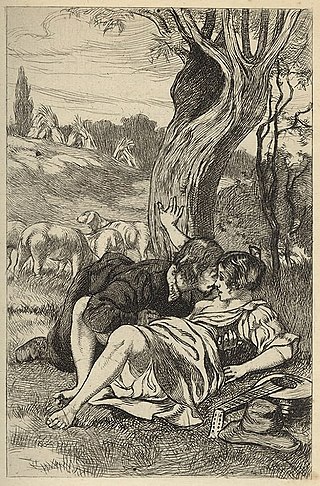
Foreplay is a set of emotionally and physically intimate acts between one or more people meant to create sexual arousal and desire for sexual activity. Although foreplay is typically understood as physical sexual activity, nonphysical activities, such as mental or verbal acts, may in some contexts be foreplay. This is typically the reason why foreplay tends to be an ambiguous term and means different things to different people. It can consist of various sexual practices such as kissing, sexual touching, removing clothes, oral sex, manual sex, sexual games, and role playing.
Soham or Sohum is a Hindu mantra, meaning "I am" in Sanskrit.
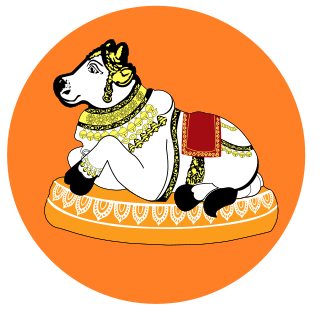
Bhairava, or Kala Bhairava, is a Shaivite and Vajrayāna deity worshipped by Hindus and Buddhists. In Shaivism, he is a powerful manifestation, or avatar, of Shiva. In the tradition of Kashmir Shaivism, Bhairava represents the Supreme Reality, synonymous to Para Brahman. Generally in Hinduism, Bhairava is also called Dandapani, as he holds a rod or danda to punish sinners, and Svaśva, meaning, "he whose vehicle is a dog". In Vajrayana Buddhism, he is considered a fierce emanation of boddhisatva Mañjuśrī, and also called Heruka, Vajrabhairava, and Yamantaka.

Ānanda Mārga, or officially Ānanda Mārga Pracāraka Saṃgha, is a world-wide socio-spiritual organisation founded in Jamalpur, Munger, Bihar, India, in 1955 by Prabhat Ranjan Sarkar, known as Shrii Shrii Anandamurti. It is also the name of the philosophy and life-style propounded by Sarkar, described as a practical means of personal development and the transformation of society. It is established in more than 180 countries across the world. Its motto is Ātmamokśārthaṃ jagaddhitāya ca.

The Kashmir Shaivism tradition, also called Trika Shaivism, is a non-dualist branch of Shaiva-Shakta Tantra Hinduism that originated in Kashmir after 850 CE. In its place of origin in Kashmir, this tradition is commonly referred to as "Kashmiri Shaivism." It later spread beyond Kashmir, with its great scholar Abhinavagupta calling it "Trika". It particularly flourished in the states of Odisha and Maharashtra. Defining features of the Trika tradition are its idealistic and monistic Pratyabhijna ("Recognition") philosophical system, propounded by Utpaladeva and Abhinavagupta, and the centrality of the three goddesses Parā, Parāparā, and Aparā.

The Kamakhya Temple at Nilachal hills in Guwahati, Assam is one of the oldest and most revered centres of Tantric practices, dedicated to the goddess Kamakhya. The temple is the center of the Kulachara Tantra Marga and the site of the Ambubachi Mela, an annual festival that celebrates the menstruation of the goddess. Structurally, the temple is dated to the 8th-9th century with many subsequent rebuildings—and the final hybrid architecture defines a local style called Nilachal. It is also one among the oldest 4 of the 51 pithas in the Shakta tradition. An obscure place of worship for much of history it became an important pilgrimage destination, especially for those from Bengal, in the 19th century during colonial rule.
The Avatar Series, originally The Avatar Trilogy, is a series of Dungeons & Dragons fantasy novels in the Forgotten Realms setting, covering the event known as the Time of Troubles.
Neotantra, navatantra, or tantric sexuality is a Western new religious movement influenced by the Eastern esoteric spiritual traditions of Tantra. Rooted in elements of Hindu and Buddhist tantras, neotantra blends New Age interpretations with modern Western perspectives, often emphasizing the sexual aspects of these ancient traditions. While some proponents reference traditional texts and principles, many utilize tantra as a broader term encompassing sacred sexuality, occasionally incorporating unconventional practices. However, neotantra does not always adhere to the complete range of Indian tantric practices, particularly the reliance on a guru.
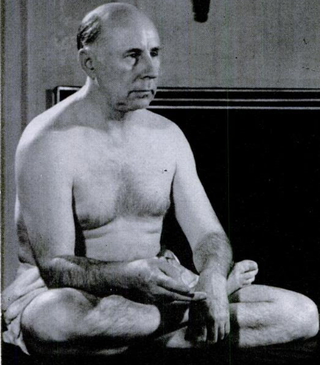
Pierre Arnold Bernard — known as "The Great Oom", "The Omnipotent Oom" and "Oom the Magnificent" — was a pioneering American yogi, scholar, occultist, philosopher, mystic and businessman.
The Yogini Tantra is a 16th- or 17th-century tantric text by an unknown author either from Assam or Cooch Behar and is dedicated to the worship of Hindu goddesses Kali and Kamakhya. Apart from religious and philosophical themes, this voluminous tantra contains some historical information.
The Agamas are a collection of several Tantric literature and scriptures of Hindu schools. The term literally means tradition or "that which has come down", and the Agama texts describe cosmology, epistemology, philosophical doctrines, precepts on meditation and practices, four kinds of yoga, mantras, temple construction, deity worship and ways to attain sixfold desires. These canonical texts are in Tamil and Sanskrit.

Kali or Kalika is a major Hindu goddess associated with time, change, creation, power, destruction and death in Shaktism. Kali is the first of the ten Mahavidyas in the Hindu tantric tradition.
The Sarvatathāgatatattvasaṃgraha sutra, also known as the Tattvasaṃgraha Tantra, is an important seventh century Indian Buddhist tantric text. Although the scripture refers itself as a Mahayana sutra, the content is mainly tantric in nature and thus is sometimes called a tantra. This work is an important source for the Shingon tradition.
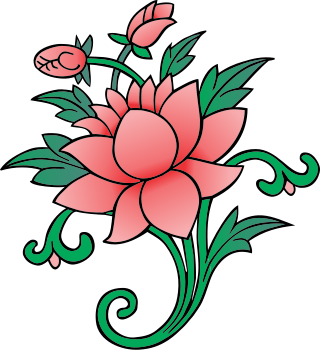
Nyingma Gyubum is a collection of Vajrayana texts reflecting the teachings of the Nyingma ("Ancient") school of Tibetan Buddhism.

Shadowdale is an adventure module published by TSR in 1989 for the Advanced Dungeons & Dragons fantasy role-playing game. It is the first of the three-part "Avatar" series, the second being Tantras and the third Waterdeep. The trilogy of adventures were written and released at the same time as an identically titled trilogy of novels.

Waterdeep is an adventure module published in 1989 for the Dungeons & Dragons fantasy role-playing game. It is the last of the three-part "Avatar" series, the first being Shadowdale and the second Tantras.
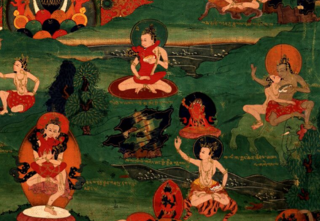
Karmamudrā is a Vajrayana Buddhist technique which makes use of sexual union with a physical or visualized consort as well as the practice of inner heat (tummo) to achieve a non-dual state of bliss and insight into emptiness. In Tibetan Buddhism, proficiency in inner heat yoga is generally seen as a prerequisite to the practice of karmamudrā.

Lama Kazi Dawa Samdup is now best known as one of the first translators of important works of Tibetan Buddhism into the English language and a pioneer central to the transmission of Buddhism in the West. From 1910 he also played a significant role in relations between British India and Tibet.














